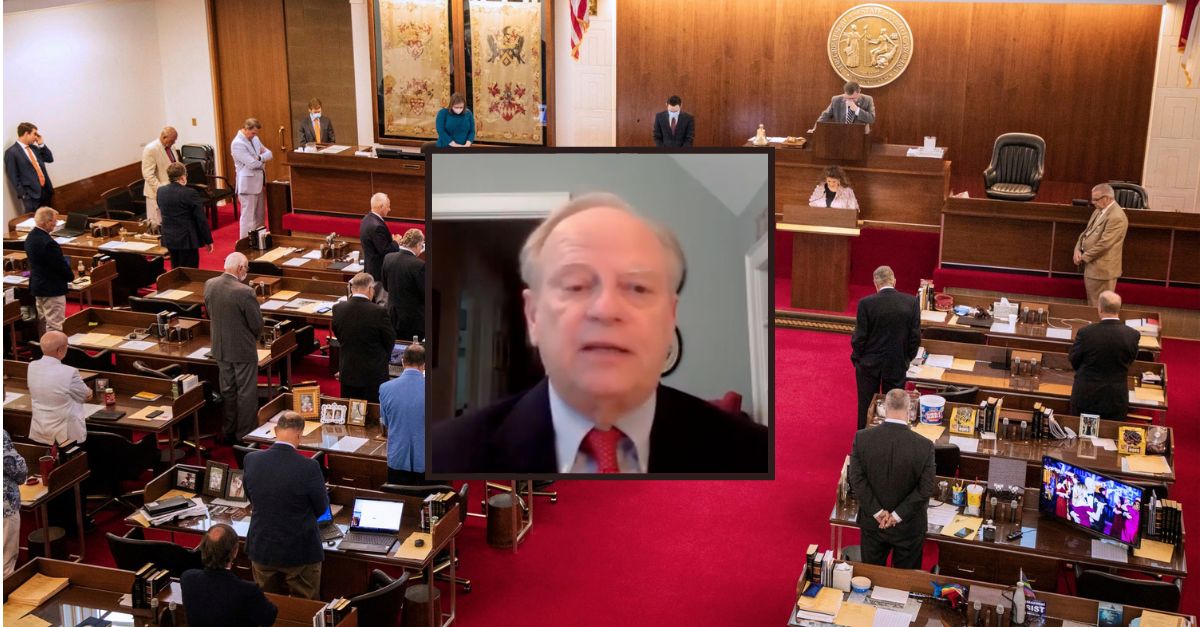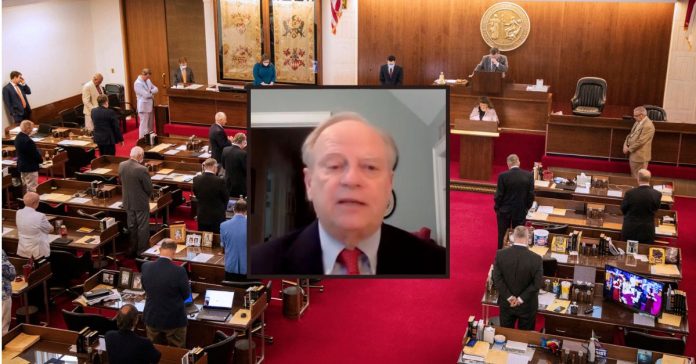
Background: Members of the North Carolina House of Representatives stand in prayer, May 2, 2020, in the North Carolina General Assembly building in Raleigh, N.C. (Casey Toth/The News & Observer via AP). Inset: Former NC Supreme Court Justice Robert Orr (via YouTube/WXII).
A former North Carolina Supreme Court Justice who previously consulted on election maps in the state is now leading a group of voters suing the state elections board and two lawmakers over recently redrawn voting districts, arguing that certain districts do not offer any meaningful choices in the upcoming election.
Robert Orr, who served on the North Carolina Supreme Court from 1995 to 2004, is representing nearly a dozen voters in a lawsuit against the Tar Heel State’s board of elections and leading members of the General Assembly. According to the complaint, filed Wednesday, recent actions in the state have led to the creation of noncompetitive voting districts, which Orr argues violates North Carolina’s constitution.
“By intentionally manipulating the electoral odds and stacking the electorate to give an unfair electoral advantage to a particular political party and its candidates in selected districts, the General Assembly has attempted to preordain the outcome of elections in certain districts,” the complaint says.
North Carolina’s constitution, Orr explains in the complaint, specifically gives residents of the state the right to “frequent” and “free” elections. Although the right to “fair” elections is not explicitly stated in the state constitution, it exists nonetheless.
“If the citizens of North Carolina are guaranteed by their State Constitution the right to ‘frequent’ and ‘free’ elections, then surely the Constitutional guarantees them the right to ‘fair’ elections,”” the complaint says. “After all, what good are ‘frequent’ elections if those elections are not ‘fair?’ Likewise, what good are ‘free’ elections if those elections are not ‘fair?’”
The right to free elections in the state, while not enumerated in the constitution, is still “reserved by the people and fundamental to the very concept of elections and the underpinnings of democracy,” the complaint says. “Without ‘fair’ elections, the framework of our government would rest not on principle and the will of the people, but instead, on partisan politics, exercised not by political parties or particular entities, but by the heavy hand of government itself, in this case the General Assembly.”
Orr alleges that the defendants wrongfully used voter information — such as “party registration, race, ethnicity, and the voting tendencies” of a particular precinct — to redraw districts that would ensure a Republican victory in the 2024 election.
“By using this information, the governmental entities in control of the apportionment can effectively predict to a substantial degree the election results for future elections within each newly apportioned district and can predict to a degree certain the election results in the most immediate election,” the complaint says.
In addition, after adopting a congressional redistricting law in 2023, the General Assembly members “used technology and data in such a way as to reapportion voters so as to create an unfair advantage for their political party in the ensuing elections in those districts,” according to the complaint.
This, Orr alleges, does not make for a “fair” election.
The complaint also accuses defendants, Philip Berger, the president pro tem of the state Senate, and Timothy Moore, the speaker of the North Carolina House of Representatives, of carrying out the redistricting process in secret.
“Upon information and belief, the apportionment conducted in 2023 for the 2024 congressional and legislative elections was conducted in secrecy by representatives of Defendants Berger and Moore in consultation with a redistricting consultant from Ohio,” the complaint says. “Neither the public nor representatives of the minority party leadership were allowed to participate in the apportionment process or observe the process determining which citizens in which precincts or census blocks would be aggregated together to form electoral districts.”
Orr says it was Moore and Berger’s intent “to take a substantial number of voters likely to support their party’s candidates and move them into” favorable districts.
Indeed, registration figures and voting patterns show “the intentional stacking of Republican leaning voters” in the newly reapportioned districts “so as to unfairly skew the election results for Congress to favor the Republican nominee,” Orr argues.
Orr notes that in one district, the previously competitive NC 6, no non-Republican candidates even bothered to register to run, while the district had six Republicans file for the primary, “thus guaranteeing no choice for voters regardless of their political party in the general election and guaranteeing that a Republican will win the congressional seat in 2024.”
Orr, who retired from the bench in 2004, was previously appointed by the state’s high court to consult on the drawing of electoral maps in 2022 after previous GOP redistricting efforts were deemed unconstitutional. Those maps left state Republicans one seat short of a supermajority in the General Assembly.
Most of the plaintiffs in the case are Democrats, and the remaining are unaffiliated with a political party.
The plaintiffs in the case are seeking a declaration that the citizens of North Carolina “have an unenumerated constitutional right to fair elections” under the state’s constitution and that current state law violates that right.
They also want the court to ignore the redrawn districts “until constitutionally complaint districts are apportioned,” and to “take such actions necessary to order the adoption of a constitutionally fair and valid reapportionment” of the districts, and any others found to be unconstitutional, for the 2024 elections and thereafter. In addition, the lawsuit seeks reapportioning the remaining districts to comply with a “one person, one vote” standard.
A spokesperson for the elections board told Law&Crime that the board does not generally comment on pending litigation, but it “will respond in court.”
Read the complaint here.
Have a tip we should know? [email protected]

